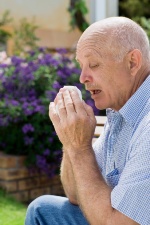 Seasonal allergies are very common and can affect people of all ages. Typically, depending upon where you reside, the spring, summer, and early fall are the worst months if you are an allergy sufferer. Allergy symptoms usually involve the mucous membranes of your eyes, nose, throat and upper respiratory track. This can lead to redness, itchiness, mucous discharge, and even wheezing, coughing, and sneezing—aggravating allergy symptoms that can decrease your quality of life significantly.
Seasonal allergies are very common and can affect people of all ages. Typically, depending upon where you reside, the spring, summer, and early fall are the worst months if you are an allergy sufferer. Allergy symptoms usually involve the mucous membranes of your eyes, nose, throat and upper respiratory track. This can lead to redness, itchiness, mucous discharge, and even wheezing, coughing, and sneezing—aggravating allergy symptoms that can decrease your quality of life significantly.
You’re likely to suffer allergic reactions when you’re exposed to pollen, trees, flowering plants, and grass, which introduce air-borne particles into your mucous membranes.
A common allergic condition is hay fever. If you suffer from hay fever, then particles react with your immune system and the result is an increase in the chemical histamine. What can you take that is natural, safe, and helps defend against hay fever and seasonal allergy symptoms? Here are the top five nutrients I recommend:
1. Vitamin C
This nutrient, which is contained in dark and lightly colored fruits and vegetables, can help prevent the release of histamine from the cells which line the mucous membranes of your upper respiratory tract. I recommend those who regularly suffer from hay fever take 500 mg of this vitamin, three or four times a day.
MORE: Why vitamin C is good for your heart
2. Quercetin
This nutrient, considered a bioflavonoid, is found in higher amounts in the skins and seeds of certain types of fruit, such as citrus and grapes. Quercetin works with vitamin C to decrease histamine’s effects on your mucous membranes by helping prevent its secretion from mast cells. I recommend taking 100-200 mg of quercetin, two to three times per day.
3. Grape Seed Extract
This specialized nutrient is called a proanthocyanidin, which is also in the bioflavonoid family of chemicals. It decreases inflammation in your upper respiratory track and, combined with the above two nutrients, can decrease free-radical production which can lead to cell damage. I recommend a supplement containing 300 mg of grape seed extract per day during the peak allergy season.
4. Essential Fatty Acids
The fats found in oily fish and flaxseeds are in the omega-3 family of unsaturated fatty acids and are not made in the human body. We need these nutritional “superstars” for many important reasons. One of the more important functions of the omega-3 family is its control of the inflammatory response. These oils not only prevent inflammation from starting but can reduce the resulting damage to your cells.
The omega-3 fatty acids also affect the way your immune system reacts after you are exposed to air-borne particles. I recommend taking at least 500 mg of omega-3 supplements, three times per day, with food.
5. Magnesium
This mineral—found in higher amounts in nuts, seeds, and whole grains—is extremely important if you want to decrease your allergy symptoms. I have found this nutrient to be very important in decreasing the inflammation and wheezing that can be caused by pollen exposure.
As an asthmatic myself, I can also tell you how this “super mineral” influences the symptoms of allergic asthma. Magnesium can directly affect the cells which line your bronchial tubes by reducing the inflammation of the mucus membrane and relaxing the muscles which line your bronchioles. This improves your ability to breathe freely!
Supplements containing 500 mg of magnesium, taken with 800-1,000 mg of calcium per day are recommended.
Source(s) for Today’s Article:
Zhou, D.Y., et al., “Grape seed proanthocyanidin extract attenuates airway inflammation and hyper responsiveness in a murine model of asthma by down regulating inducible nitric oxide synthase,” Planta Med. September 2011; 77(14): 1575-81.
Bielory, L., “Complementary and alternative interventions in asthma, allergy, and immunology,” Ann Allergy Asthma Immunol. August; 93(2 Suppl 1):S45-54.
Chilton, F.H., et al., “Mechanisms by which botanical lipids affect inflammatory disorder,” Am J Clin Nutr. February 2008; 87(2): 498S-503S.
Chilton, F.H., et al., “Mechanisms by which botanical lipids affect inflammatory disorder,” Am J Clin Nutr. February 2008; 87(2): 498S-503S.
Elsen, L., et al., “Long chain N-3 polyunsaturated fatty acids in the prevention of allergic and cardiovascular disease,” Curr Pharm Des 2012; 18(16): 2375-92.
Torres, S., et al., “Effectiveness of magnesium sulfate as initial treatment of acute severe asthma in children, conducted in a tertiary-level university hospital: a randomized, controlled trial,” Arch Argent Pediatr. August 2012; 110(4): 291-6.
“Magnesium,” Office of Dietary Supplements web site, July 13, 2009; http://ods.od.nih.gov/factsheets/Magnesium-HealthProfessional/
